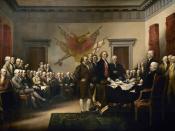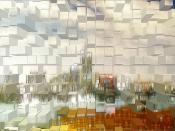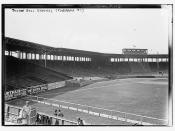Having discovered America in 1492, Columbus lead the way for many other nations to establish colonies there and by 1700 England held 13 colonies on the east coast. These included Pennsylvania,founded by William Penn, Massachusettes,favoured by the pilgrim fathers and Maryland, favoured by Catholics.
Early conditions for settlers meant that co-operation was necessary and they formed tight knit communities where everyone pitched in and all had equal share. This established the particularly American concept of 'equal rights for all and special treatment for none'-the foundation of the constitution.
The French and Indian War of 1756-1763 led to a period of neglect in the colonies,as Britain plunged herself into fighting the French and the Eastern sea board became accustomed to a significant degree of political self-regulation. However, in 1763,England passed the Proclamation of 1763, forbidding the colonists from moving west beyond the Appalachian mountains. Furthermore, the war put huge financial demands on Great Britain, and forced Parliament to look to the colonies, for revenue.
Thus, in 1764, England passed the Sugar Act, restricting trade between colonies and pushing to the limit English revenue. Interestingly, the colonial response to the Sugar Act was one of nervous anticipation, but not protest. Most colonies "had no quarrel with Parliament's power to regulate their trade." Yet this was not to be when news of a proposed Stamp tax was beginning to filter into the colonies. With these rumours came the worry of the colonies previously unaffected civil liberties, as the stamp tax, unlike the tax on sugar,was designed as an internal tax levied on an unrepresented people.
On the 22nd March, 1765, the English Parliament passed the Stamp Act. By the 14th August, the Boston mob hung and burned an effigy of Andrew Oliver, the royal official appointed by the English crown to collect the...


